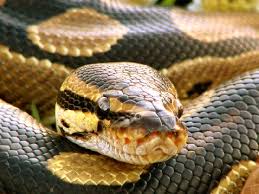Monday, April 27, 2015
Herps In the News: Exotic Pet Ownership in Australia
The issue of exotic pet ownership has become a controversial topic in many countries around the world as scientists and environmentalists continually exemplify the detrimental effects of introducing new species to similar habitats that they did not evolve and develop in. Introduction of these types of animals can lead to proliferation of invasive species causing drastic changes in environmental dynamics, it is because of this that many people strongly oppose allowing exotic pets to be owned as household pets.
Recently in Gold Coast Australia a two meter boa constrictor was released into the wild by police after it had been found inside a homeowners house. Queensland Professor Brian Fry commented that it is highly unlikely the boa constrictor would survive in such unfamiliar conditions leading him to advocate for the legalization of exotic pet ownership by citizens of Australia. Fry notes that it is very nearly impossible for individual exotic pets to be able to create any large population shift due to lack of exposure to one another as well as inability to quickly adapt to their environment once they have been released into the wild. Massive populations of invasive species have only been so successful in certain areas because large populations of that animal had already been in the area and were just rapidly released leading to population explosions. An example of this is pythons in Florida, which following a hurricane in the 1980's caused the release of thousands of captive pythons leading to the pythons to proliferate across that state and now they are considered the most dangerous invasive species in Florida.
Doctor Fry makes excellent points in his interview and provides strong evidence that large populations of invasive species will not arise from citizens owning exotic pets. The real question is if it is ethically wrong to keep exotic pets in small confined spaces removing them from their environment and creating an unnatural lifestyle for the creature.
I believe it is wrong for uneducated citizens to be allowed to take responsibility for such beautiful and rare creatures as well as unfair to remove a creature from the wild to leave it trapped in a small box for the rest of its life.
 http://www.abc.net.au/news/2015-04-27/professor-calls-for-legal-ownership-of-exotic-reptiles/6423734
http://www.abc.net.au/news/2015-04-27/professor-calls-for-legal-ownership-of-exotic-reptiles/6423734
Subscribe to:
Post Comments (Atom)
3 comments:
I couldn't agree with you more. I am an owner of common local turtle species: Sternotherus odoratus, Trachemys scripta, and Chrysemys picta dorsalis. As a responsible owner, I have tried to match their large habitat (currently 75 gallon tank), with their natural environment. They are well cared for and loved. I will admit my slider is from the environment, (a bird dropped her on the concrete patio), but my other two are tank bred from tank bred parents. The other part of your discussion, you discussed the problems with exotic animals being abandoned. This is a huge problem in Florida, and as a Floridian, I can tell you stories, first hand, of seeing strange exotic animals. I once had a 7-8 foot albino burmese python (Python bivittatus) wrapped around my orange tree! Florida has large populations of pythons in the Everglades that have been feeding on the natural wildlife.
What kind of a "Doctor" is this Fry?
Maybe the environment in Australia is different enough to be inhospitable to escaped snakes, but the Florida python disaster makes me very wary of any potential for accidental release into warm, humid habitats.
That said, pet ownership is a complicated and multidimensional issue, and Prof. Fry points out some of the difficulties involved with regulating anything. On the other hand, for every outlaw who wants to prove their "badness" by owning an illegal reptile, I would wager there are many law-abiding, yet uninformed, citizens ready to plunk down their cash for a legal pet with little information about how to care for it properly.
Post a Comment